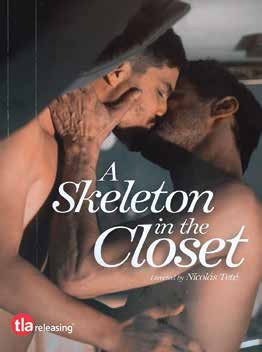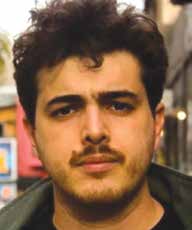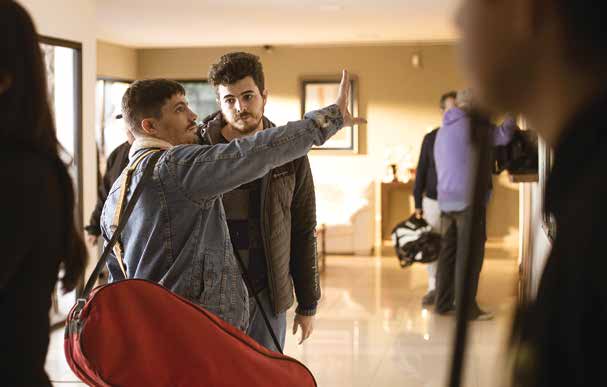
By Gary Kramer–
A Skeleton in the Closet, out January 12 on DVD, is out gay Argentine filmmaker Nicolás Teté’s poignant drama about Manuel (Facundo Gambandé), a gay man who has been living in Buenos Aires, where he is studying architecture and dating Maximo (Ramiro Delgado).
When he returns to his hometown of Mercedes for his parent’s wedding anniversary, however, his mood changes. He has not felt comfortable with his parents, Clara (María Fernanda Callejón) and Luis (Diego De Paula), since coming out last Christmas. Moreover, Maximo soon breaks up with him. To cope, Manuel begins seeing Martín (Lucas Ferraro), his former teacher, and tries to find some happiness.
In a recent interview via WhatsApp for the San Francisco Bay Times, Teté talked about A Skeleton in the Closet.

Gary M. Kramer: How autobiographical is this film?
Nicolás Teté: The most biographical thing is the house, because it is my parents’ house. The bedroom is my childhood bedroom. I am gay, like Manuel, but I made the drama fictional. All people have a difficult time with their parents when they come out as gay, but this story is not my life. I think it’s boring to write about my life. I never had a sexy teacher!
Gary M. Kramer: The film depicts attitudes towards homosexuality. Can you talk about how life is in places like Mercedes for LGBT folks?
Nicolás Teté: It is very difficult. When I was a teenager and I started to think about my sexuality, I didn’t have options. If I am gay, my family will hate me; this town is not for me. When I was a teenager, I didn’t know other gay people in the city. The only gay people in the city had problems. They were hairdressers, and people thought and talked about [homosexuality] like it was a bad thing. But in Buenos Aires I can have a gay life and it’s not a problem. But when you go home for holidays, it’s a problem again. In the last few years, I recognized that Mercedes has a little LGBT life. The new generation is more open. I see that in cultural events. It’s a little better for gay people in the town. It’s difficult for families, because of Catholicism. And we’ve had many cases of homophobic attacks in the streets for gay couples who hold hands or kiss in the street. We have gay marriage, but some stuff hasn’t changed.

Gary M. Kramer: What can you say about the film’s themes of secrets and lies? The characters are all in various states of denial.
Nicolás Teté: I didn’t want to make a film that [stated] the problem was Manuel was gay. During the film we can see that Manuel has other problems, and that the family has other problems. But the real problem is that Manuel doesn’t know what to do with his life, and the family problem is that the family doesn’t know how to have a good relationship with Manuel. The secrets make things difficult. When I was in the closet, my relationship with my parents was very hard because I had a secret, and it made me angry because I had to keep that secret.
Gary M. Kramer: You cast a gay actor in the lead role. How important is it for you to make gay cinema with gay talent?
Nicolás Teté: It’s important for me, and it’s important that Facundo is gay and not from Buenos Aires, but from Cordoba, another [rural] town. When we first met, three years ago, we started to talk about personal things and I knew he was perfect, because he lived similar things that Manuel and I lived, so he had an understanding of the character. The film is Manuel’s face, so I needed a good actor who understood the film. I always thought I’d cast a gay actor for the role.

Gary M. Kramer: Likewise, the film is loving, but not overly sexy. Do you feel pressure to cater to a gay audience?
Nicolás Teté: No, it’s my first gay film. I have made three other films. One had some gay themes, but I was in the closet when I shot that film (The Last Family Holidays). I don’t want to make big gay films. This is my first gay-themed film. I wanted to make a feel-good movie. It’s a good gay film for people who are not gay. It’s about feelings and family, so it’s good to watch with your mother or father. It’s not a movie for homophobic people. It starts showing his gay life.
Gary M. Kramer: The film is about the characters finding happiness. What makes you happy?
Nicolás Teté: Making films. I am happy being on set. And I am happy with my boyfriend and our dog. Watching films, writing. And spending time with my family.
© 2021 Gary M. Kramer
Gary M. Kramer is the author of “Independent Queer Cinema: Reviews and Interviews,” and the co-editor of “Directory of World Cinema: Argentina.” Follow him on Twitter @garymkramer
Published on January 14, 2021
Recent Comments